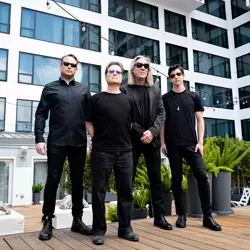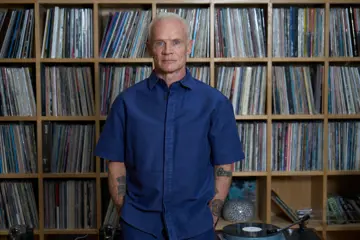 Violent Femmes
Violent FemmesFather/daughter music duo Rayella hail from the Marlinja Community, found more than 700 kilometres south of Darwin in the remote Northern Territory outback, but seem completely at ease in the sophisticated confines of The Tivoli as they kickstart tonight’s proceedings with a heartfelt set of campfire songs.
Raymond Dixon provides the acoustic guitar bed over which the younger Eleanor adds her powerful and sometimes soaring vocals, their empowering songs all dealing with their ancestry and spiritual connection to the place we all call home. The pair effortlessly hold most of the large crowd’s attention for the duration.
At first, it’s hard to discern the entirely black-clad members of Violent Femmes as they file on stage in front of the stage’s stark black backdrop, but tonight’s performance is in no major need of concert trickery or embellishment. You get the impression that nearly everyone in attendance is enthralled with the Milwaukee veterans' eponymous 1983 debut, but has more of a passing acquaintance with the decades of work that have followed, so the room’s mood remains slightly reserved as they open with recent B-side You Move Me — touring saxophonist Blaise Garza adding a veneer of sophistication to the trio’s usual skiffle sensibilities — then move on through some more relatively recent album tracks and singles in the form of I'm Nothing, Memory, Breakin' Up and Good For/At Nothing.
The crowd's lack of real connection to these songs is strange because they exhibit all of the strength of those earlier songs — particularly frontman Gordon Gano’s angst-ridden worldview and the band’s taut, retro-tinged musicianship — yet the lack of overt familiarity seems to find many in the audience slightly holding back. Eventually, the vibe ramps up exponentially when a triumvirate of first-album tracks are played in a row, the evergreen Kiss Off getting people singing with true gusto for the first time before they follow with Prove My Love (with its timeless “What do I have to do?” refrain) and the ever-creepy Promise. Stoic founding bassist Brian Ritchie is the perfect foil to Gano’s rampant insecurities — the long-haired honorary Aussie confident and assured as he pumps out deep bottom end — while new percussionist John Sparrow slots straight in between them on the standing kit.
Don't miss a beat with our FREE daily newsletter
Gano’s teen-anchored muse shines through in Life Is An Adventure, murder ballad Country Death Song remains as morbidly fascinating as ever and finds Gano deftly wielding a banjo, while vaguely surreal recent single I Could Be Anything even hints at a new optimistic bent amid its trippy imagery. As Sparrow moves over to the cajon, Gano conjures a lengthy set-up about the impending cyclone before delivering a stinging burn about Australia losing the cricket in India, and after Love Love Love Love Love they get the beaming Rayella team back out among the action. Gano’s strident a cappella intro to Jesus Walking On The Water belies the song’s eventual country-gospel leanings, after which a poignant mass singalong to Good Feeling segues into the frantic punk squall of Old Mother Reagan, Gano’s adenoidal voice now set to full sneer mode.
The repeated line “I hate the President” from the verse of I Hate The TV seems to be delivered with particular venom — although it’s easy to read anti-Trump sentiment into pretty much anything these days — before the twisted ode Gimme The Car finds Gano grappling with youthful lust and desperation, the perfect segue to the first album’s mordant Gone Daddy Gone, which finds Ritchie banging out the snaking xylophone line with fervent vigour. As cryptic urban faux-drama Waiting For The Bus wraps up, we’re treated to the full three-piece version of the Femmes’ horn section, the Horns of Dilemma, for an esoteric take on Black Girls — Sparrow moving to a full kit on stage right for the first time tonight, while Ritchie opts for a conch-shell solo — and they wrap up the set proper with a celebratory runthrough of American Music, perfectly appropriate given this band’s idiosyncratic appropriation of all that came before them in their homeland.
As we wait in darkness, a cursory pass over that first album’s tracklist makes the encore selections obvious before they even step back onto the stage, and the by-now-well-lubricated crowd get to bellow away to their hearts' content to both Blister In The Sun and Add It Up, no doubt two very important musical pieces to the jigsaw that was each person’s childhood (or young adulthood as the case may be). That Violent Femmes’ early music played such an important part in the upbringing of so many Australians remains why they’re so beloved in this country and, while you get the feeling they only begrudgingly put up with the nostalgia aspect of proceedings, our country’s seemingly bottomless love for this band still seems very much reciprocated.















